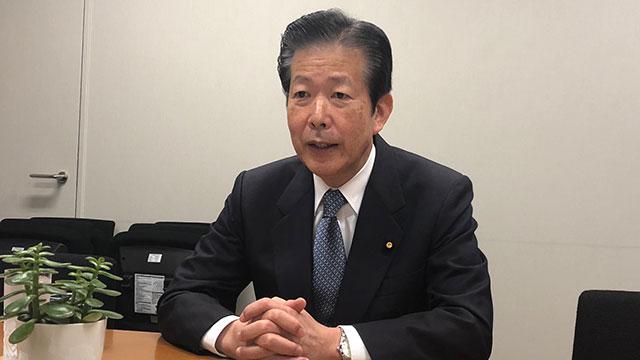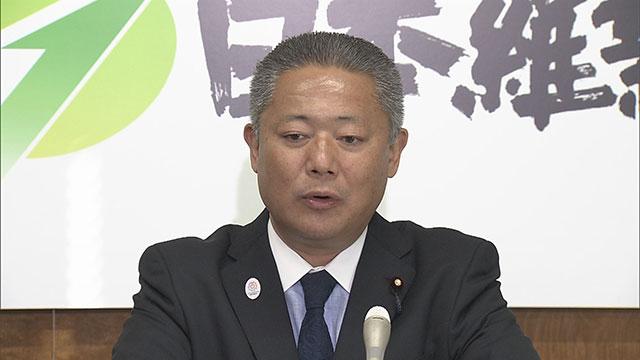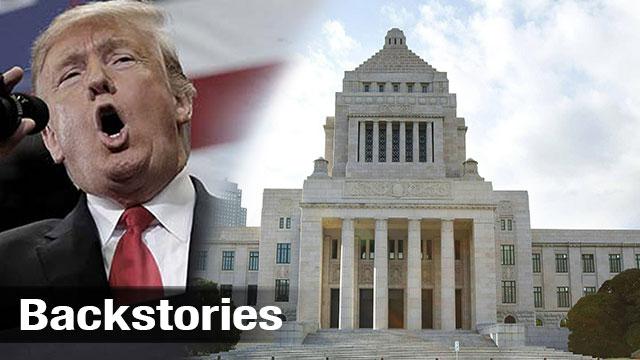Fumio Kishida, Former Foreign Minister and incumbent Liberal Democratic Party policy chief, LDP -- the main ruling party

Q: Which issues did you focus on from the elections?
Kishida: US policies have been totally changed by the Trump administration, including withdrawal from the TPP negotiations and the Paris agreement. Japan felt this posed a problem to some extent, so I was strongly interested in this election in terms of how US citizens evaluate the changes.
Right now, I cannot be sure of the impact of the election results. Some people say that President Trump may become more radical, others say that he might put a brake on implementing his policies, while yet others say he can enhance the unity of his supporters by blaming the Democratic Party for difficult issues which don’t pass Congress. It’s very hard to judge the impact of the election results.
For Trump, the real game is the presidential election in 2020. So, I want to watch with a sense of vigilance how the US will do two years from now.
Q: In September, Japan and the US agreed to one-on-one talks on trade, even though Japan has been asking the US to return to the TPP. There are some politicians and experts who are concerned that President Trump will get tougher on Japan because he might focus on trade or diplomacy to produce the outcome he wants, instead of on internal issues that might be blocked by the Democratic Party in the House of Representatives.
Kishida: Japan must maintain its policy of free trade and develop the relationship with the US based on what the two countries have done. Japan has no choice but to promote its national interest and insist on what we believe is best.
Q: Do you mean it's inevitable that the relationship between the two nations will get worse temporarily?
Kishida: Japan should not give up its national interest. We have to place priority there. That is a chance to show our diplomatic skill.I can only say now that Japan will protect free trade and its national interest, and will negotiate with the US.
I don’t think that the election results will have an impact on US diplomacy, but we have to expect that Trump will make several policies with an eye on the next presidential election. I cannot say exactly how, but I predict the situation between the two nations will continue to require careful management.
Q: What do you think of the US House now having more than 100 women?
Kishida: It symbolizes a shift in the US and internationally. I imagine that the Democratic Party has got on board with the Me Too movement and attracted voters’ sympathy. Unfortunately, in Japan there are not many women in the political arena. We need to look at what's happening in the US and think about our own situation.
Q: As a politician, what did you get from these elections?
Kishida: We have to consider what we stand for in an election, but it’s the citizens who decide how they will vote. Therefore, the important thing is for people to realize what is most important to them. I imagine people will be talking about Japanese politics now, after seeing the US elections. I believe it's important that we discuss what Japan should be doing.
Natsuo Yamaguchi, Chief Representative of Komeito-coalition partner of LDP

Q: Which issues did you focus on from the elections?
Yamaguchi: I was interested in how US citizens judge the Trump administration because his strategy seems to be to extend Republican influence by promoting conflict and division. I also focus on how the President is laying the foundations for the 2020 presidential election.
The Democratic Party has gained seats in the lower house by winning support from women, young people and minorities. I think that highlights the criticism of the President. On the other hand, Trump anticipated the critics to some extent and focused on the upper house. His method has worked well from the point of view of the next presidential election.
Q: What do you expect from the elections in terms of Japan-US trade negotiations?
Yamaguchi: I expect US policies on diplomacy and security will not change, as the Republicans kept their majority in the Senate. Trade policy is deeply related to both, but it has a big impact on the economy. So we need to pay close attention to the behavior of the Trump administration. He directed harsh criticism at Japan recently, especially notable as the US is trying to negotiate on trade bilaterally, instead of multilaterally like the TPP. Moreover, Japanese cars were a focus and he asserted that Japan doesn’t import American automobiles. We have to prepare for tough trade negotiations with the US and the Japanese government should protect its national interest and the limits on the TPP in terms of agriculture.
When we negotiate, we need to persuade Trump that Japan has produced employment in the US and invested and created profits there.
Q: President Trump will face a presidential election in 2020. Prime Minister Abe also has an upper house election next year. For both nations, it might be a case of trade negotiations before big elections.
Yamaguchi: They may negotiate with an eye on those elections, but they can’t decide on trade rules for the sake of elections. Fortunately, Abe and Trump have a good relationship so I hope that Abe can sell Japan’s position with assurance and reach an agreement.
Q: As a politician, what did you get from these elections?
Yamaguchi: I believe there are negative impacts on society and the international arena when we promote conflict or division. “Harmony is to be valued” is a Japanese tradition. So, we need to strive for agreement among many people with differing views. We should have a sense of fusion, cooperation, tolerance and endurance in politics.
Yukio Edano, President of Constitutional Democratic Party -- the largest opposition in Japan

Q: Which issues did you focus on from the elections?
Edano: I focused on the movement of integration in terms of politics in US society, which is said to be divided. Therefore, I took notice of younger, female and minority candidates and whether or not they won, especially in the Democratic Party. People like that weren't in a position to win before. As a result, the number of female winners stands out and I see that as a big step toward gathering the power of people who are alienated by Trump, even if I cannot completely say that the Democratic Party has pushed back the Trump whirlwind.
Q: Why did you focus on that?
Edano: I feel the politics of the powerful are becoming stronger in the present climate of disparity and division. I believe that’s a common issue in developed countries. The issue of how vulnerable people can gain power in politics is a global movement, including in Japan. I thought that the midterm elections would reveal a trend.
Q: You met Senator Bernie Sanders in September. How was that?
Edano: Mr Sanders told me he is happy to see candidates who have never participated in politics. And all the politicians that I met in September in both chambers gave a stronger voice to minorities. I felt that movement in America and was focused on how it would affect the election and I see that it did have an effect.
Q: Do you think the Democratic Party got on board with that movement?
Edano: If I have to judge that, I think the Democrats have not grasped it fully yet, but I see steps toward the movement have started. Whether it will be on a full scale or not will be a focal point going toward the 2020 presidential election.
Q: Some Japanese say they worry about the trade negotiations between Japan and the US.
Edano: I think it is half right to be concerned. Even Democrats can keep in step with Republicans in terms of trade negotiations. But the results in the lower house will press the brake pedal on the hardline stance, so the administration cannot freely push ahead. Therefore, I see it as not just a negative.
Q: Some worry Japan might totally accept US demands, because the two leaders have said “Japan and US are 100% allies.”
Edano: Anyway it’s not appropriate to take a diplomatic stance like “100% allies.” I can say that the Abe administration's position has been changing since the beginning of this year. I see that Abe’s government would be shaken if he tries to accept all US demands. Therefore, it seems difficult for the Abe administration to act as Trump expected.
Q: What do you mean the changes in Abe’s government?
Edano: I suppose Abe wanted to reset his various scandals through the lower house election last year, but many people realized that the issues are rather serious after the tampering of public documents and a suicide in the Finance Ministry. In diplomacy, the situation surrounding North Korea should be welcomed by the world and Japan right now, but the Abe administration remains trapped by its previous strong stance toward the North. I assess the fundamentals of the Abe administration as having changed to a considerable degree.
Q: As a politician, what did you make of these elections?
Edano: I think the symbol of these midterms is the young woman [Ocasio-Cortez] who won in New York. The strategy of the Democratic Party was to field candidates who could be symbols, and it has worked well I think. So, easy-to-understand policies, clear appeal and symbolic candidates will bring the win. It’s the same in Japan.
Q: Do you think that women-centric or minority movements can also succeed in Japan?
Edano: The US has seen minority activists since the civil rights movement and had a female presidential candidate just 2 years ago, but it takes time to become a bigger movement in terms of gender equality. I see Japan as 50 years behind the US. But I can say now we have a movement that we never imagined, so I hope my party can play a role.
Yuichiro Tamaki, President of Democratic Party For the People -- the second-largest opposition in the national diet

Q: What was your focal point?
Tamaki: I was interested in whether or not Ted Cruz could win. I thought the upper house election in Texas was a benchmark for assessing the Trump administration. And he did win, even though the democratic opponent closed in on him. In addition, I had heard that the Republican Party was catching up in the House of Representatives, so I focused on whether the Democrats could gain a majority there.
Q: What do you expect from the results of the elections?
Tamaki: I think 2 points in particular. Firstly, I am worried about the possibility of a negative impact on the economy caused by the government shutdown. Or whether the policy of large-scale tax reduction will pass or not. I am concerned most about the confusion in US politics bringing economic chaos. Secondly, Trump may take a firmer attitude in trade negotiations to make him look appealing for the next presidential election because he cannot play a good hand in passing bills or cutting tax. I expect that he might pressure not only China, but also Japan, especially in the negotiations for a Japan-US free trade agreement that will begin in January. The Democratic Party has a view that's relatively more protectionist than the Republicans.
It’s very important to have an attitude to protect national interest fully, but the Abe administration is clingy to President Trump and he often says “100% allies.” So I am strongly concerned that Japan might give in to strong US pressure.
Q: As politician, what did you get from these elections?
Tamaki: I want to say that the key is diversity. I would like to say that several values or opinions are decreasing inside and outside the Diet due to the powerful Abe administration. We need to have mutual respect and reach agreement politely. We have to change the political situation for Japanese citizens of all parties. I was encouraged by the election results to feel that we should show that our priority is to unite people, not to divide.
Kazuo Shii, Chairperson of Japanese Communist Party

Q: What was your focal point?
Shii: I think I can say that the American people have come out in judgment against Trump’s political methods. Many showed their distaste for hegemony, xenophobia and Trump's policies of stirring up political divides. I also think that their tax incentives benefit the rich, and that they are destroying social security.
In addition, I’m interested in two things. One is the movement of young people, women and minorities all over the US and how they have contributed to the result of the election. The other is the success of candidates with socialist views, such as Ms Ocasio-Cortez in New York. This is a new trend, too. In my view, there is a background to the stagnation of US capitalism. I think young people have started to question the value of capitalism. I think it shows hope for American society.
Q: What is your view on the Japan-US trade negotiations?
Shii: I expect there is a possibility that Trump will insist on "America first" even more. I am strongly concerned about these the trade negotiations. How can we protect our agricultural industry? So Japan has to say that we will protect our national interest, otherwise we will lose economically and in terms of "food sovereignty". I want to say that following "America first" is the worst for Japan.
Nobuyuki Baba, Chief secretary of Nippon Ishin

Q: What did you conclude about the US elections?
Baba: I feel that the two party system is excellent. The American people have controlled their politics, choosing either Republicans or Democrats. Trump has continued to make confident remarks, but I hope the president will understand how the citizens feel.
Q: What is your view of Japan-US trade negotiations?
Baba: I believe it's the US that has pushed multilateral, free trade, so it's important to stop it from moving towards protectionism. Some businesses in my constituency say they've been affected by the trade conflict between the US and China. I hope Japanese companies don't suffer.
Almost every lawmaker expressed concern about the possible negative impact of the elections on Japan-US trade negotiations, and they felt positive about the number of new faces in the US Congress representing women, the younger generation and ethnic minorities.
Both Japan and the United States have major elections coming within two years. The choices that voters make will depend on how the US midterm elections affect political conditions in the two countries and global politics as well.

